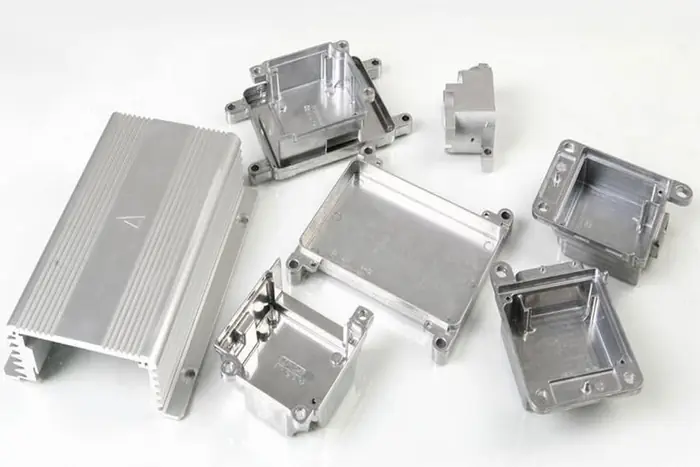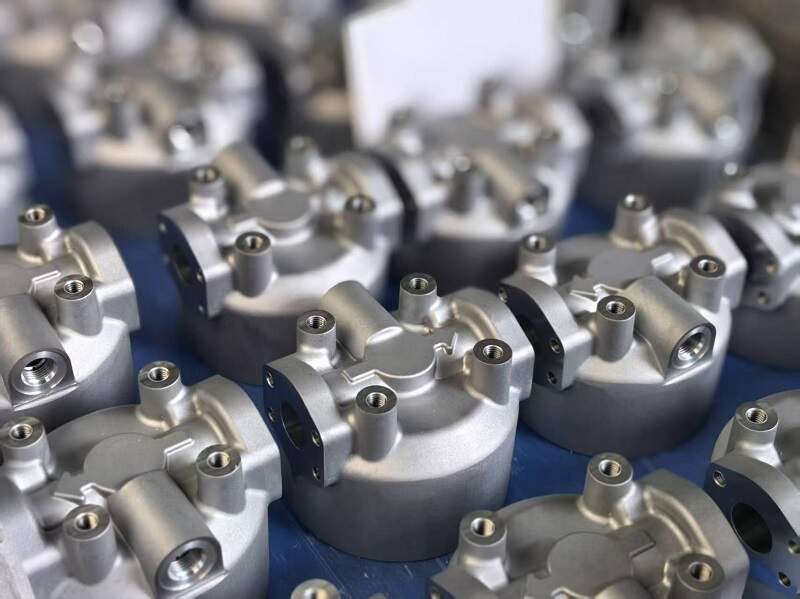Finding an Aluminum Casting Company with reliable foundry experience
Wiki Article
The Effect of Ingenious Shop Providers on Lasting Production Practices
Innovative foundry services play a vital duty ahead of time lasting production techniques. By incorporating reusing technologies and energy-efficient processes, these services considerably decrease environmental impact. Foundries can reclaim important materials, thereby decreasing dependence on virgin resources. As automation and lean production concepts get grip, manufacturing effectiveness is enhanced. The full extent of these advancements and their implications for the future of making stay to be explored.The Function of Advanced Recycling Technologies in Foundries
Advanced recycling modern technologies are transforming the landscape of factories by enhancing material recovery and lowering waste. These innovative procedures allow shops to recover important metals and products from scrap, decreasing dependence on virgin sources. By integrating sophisticated sorting, shredding, and melting methods, foundries can effectively draw out usable products from disposed of products, therefore promoting a round economic climate.Additionally, these technologies sustain the production of high-quality alloys and parts, making sure that recycled materials satisfy stringent sector standards (aluminum casting). As a result, shops are not only boosting their material effectiveness but likewise decreasing the environmental effect related to typical manufacturing techniques
This change towards progressed recycling not just bolsters economic feasibility for foundries but likewise straightens with global sustainability goals. Inevitably, the unification of these technologies represents a substantial progression in the mission for lasting production techniques within the foundry industry.
Energy Effectiveness: Lowering Consumption in Manufacturing Processes
Energy effectiveness in producing procedures is critical for lasting procedures. Techniques such as process optimization strategies, renewable resource combination, and waste heat recovery play crucial duties in lessening energy usage. By focusing on these locations, makers can considerably minimize their environmental effect while boosting performance.Refine Optimization Techniques
A substantial variety of making centers are significantly embracing procedure optimization methods to improve energy efficiency and reduce intake. These strategies entail examining and fine-tuning production operations, identifying bottlenecks, and implementing automation to simplify procedures. By leveraging data analytics, producers can keep track of energy use in real-time, allowing proactive adjustments to decrease waste. Methods such as Lean Manufacturing and 6 Sigma concentrate on enhancing and eliminating inadequacies resource allocation. In addition, advanced modern technologies like Web of Things (IoT) sensing units supply insights right into equipment efficiency, assisting in predictive upkeep that prevents power loss. In general, these procedure optimization methods not only add to reduced power consumption however also promote a culture of constant improvement within producing settings, lining up functional exercise with sustainability objectives.Renewable Resource Combination
Many manufacturing centers are increasingly incorporating renewable power resources to improve total power performance and decrease dependence on conventional power grids. This change includes the fostering of solar, wind, and biomass power, which can considerably decrease and reduce functional costs carbon impacts. By utilizing these sustainable energy resources, suppliers not only decrease their environmental effect however additionally improve energy durability. Furthermore, incorporating renewable energy systems usually involves advanced innovations such as power storage space and clever grid remedies, which optimize energy use and help with real-time tracking. This combination sustains makers in attaining governing conformity and conference sustainability objectives while cultivating innovation in production procedures. Inevitably, renewable resource assimilation stands for a crucial change in the direction of even more lasting production methods and long-lasting stability.Waste Heat Recovery
Integrating renewable power resources establishes the stage for additional developments in energy efficiency, specifically via the application of waste warm healing systems. These systems capture excess thermal power created during producing processes, which would certainly or else be lost to the environment. By repurposing this warmth, factories can significantly decrease their power intake, lower operational prices, and lessen their carbon footprint. The recovered warmth can be used for various applications, such as home heating, power generation, or preheating resources. Because of this, waste warm recovery not just improves energy performance however also adds to a sustainable production design. Innovative shop services that prioritize this modern technology are paving the way for an eco responsible commercial landscape, lining up profitability with eco-friendly stewardship.Using Eco-Friendly Products in Factory Operations
As the need for sustainable production practices expands, foundries are significantly turning to green products to boost their procedures. By integrating sustainable alternatives, such as recycled metals and bio-based binders, foundries can significantly minimize their environmental impact. These materials often need less energy for handling and can lessen hazardous exhausts throughout production.The fostering of eco-friendly products not just aligns with governing standards but likewise fulfills consumer choices for greener items. Shops are discovering innovative alternatives, such as utilizing organic ingredients that boost mold quality while continuing to be safe.
The shift to lasting materials cultivates a round economic situation by advertising resource reuse and reducing waste. Furthermore, this change can enhance the general effectiveness of factory operations, as green materials typically exhibit exceptional residential or commercial properties, leading to enhanced product efficiency - aluminum casting. Ultimately, the usage of green products stands for a vital step towards lasting manufacturing in the foundry sector

Advancements in Waste Monitoring and Decrease Techniques
The change towards environmentally friendly materials in shop operations paves the method for improvements in waste monitoring and reduction strategies. Cutting-edge shop solutions are significantly taking on techniques that decrease waste generation and advertise recycling. Strategies such as closed-loop systems permit the reuse of products, greatly reducing the volume of waste created during producing procedures. In addition, developments in purification and separation innovations allow the effective recovery of important by-products, which can be reintegrated right into the manufacturing cycle.In addition, the implementation of real-time surveillance systems supplies data-driven understandings into waste generation patterns, promoting educated decision-making to enhance source use. Shops are additionally checking out biowaste options, transforming natural waste right into power or usable materials, additionally advertising sustainability. These developments not only add to a circular economic climate but likewise boost the overall environmental performance of factory procedures, underscoring the industry's commitment to reducing its ecological impact.
The Influence of Automation on Lasting Manufacturing
While numerous markets go for sustainability, automation emerges as a necessary aspect in improving sustainable production methods within factories. By integrating automated systems, factories can accomplish higher efficiency, minimize waste, and reduced energy consumption. Automated processes permit accurate control over production parameters, decreasing issues and revamp, which subsequently conserves resources.In addition, automation assists in the tracking of environmental effects, making it possible for real-time adjustments that straighten with sustainability goals. Aluminum Casting Company. Advanced robotics and artificial intelligence can optimize product usage, causing substantial reductions in scrap and discharges
Furthermore, automated technologies promote much safer workplace by managing hazardous tasks, therefore boosting employee well-being while making sure compliance with ecological regulations. Generally, the fostering of automation within shops not only improves procedures but also plays a crucial function ahead of time sustainable production practices, adding to a more liable industrial landscape.
Situation Researches: Successful Execution of Lasting Shop Practices
Successful implementation of sustainable practices in shops can be illustrated via various instance research studies that highlight innovative approaches and measurable results. One remarkable instance is a mid-sized shop that took on a closed-loop water recycling system, decreasing water consumption by 40% and lowering wastewater generation. Additionally, this center altered to using environmentally friendly mold materials, which not just better product quality yet also improved worker security.An additional substantial situation included a large foundry integrating eco-friendly power resources, such as photovoltaic panels, which counter 30% of its energy requires. This initiative not just lowered operational costs but additionally added to a considerable reduction in carbon Aluminum Foundry exhausts.
Finally, a factory that implemented lean production strategies reported a 25% increase in efficiency, resulting in much less material waste and optimized production processes. These instances collectively underscore the substantial advantages and sustainability advancements achievable with ingenious factory practices.
Often Asked Inquiries
How Do Cutting-edge Shop Providers Add To Overall Sustainability Goals?
Ingenious factory solutions enhance total sustainability objectives by maximizing source usage, minimizing waste, and enhancing power efficiency. These improvements add to lower carbon impacts and advertise environmentally responsible techniques within the production field, supporting more comprehensive sustainability initiatives.What Are the Economic Conveniences of Embracing Lasting Factory Practices?
Adopting lasting foundry methods can reduce functional costs, improve source efficiency, and improve competitiveness. In addition, these practices can draw in eco-conscious consumers and capitalists, ultimately causing increased earnings and long-term economic viability for companies.Just How Can Little Foundries Apply Sustainable Advancements Properly?
Little shops can implement lasting technologies successfully by taking on energy-efficient modern technologies, optimizing resource use, educating team on sustainable methods, collaborating with distributors for environment-friendly materials, and participating in continuous improvement processes to minimize waste and discharges.What Certifications Exist for Lasting Foundry Procedures?

Just How Do Customer Preferences Impact Lasting Production in Foundries?
Consumer choices substantially affect lasting production in factories by driving demand for environment-friendly items. As consumers prioritize sustainability, shops adapt their methods, incorporating greener materials and innovations to satisfy market expectations and boost their affordable advantage.By repurposing this warmth, factories can considerably reduce their power usage, lower functional costs, and lessen their carbon footprint. Shops are additionally checking out biowaste services, transforming natural waste into power or useful materials, better promoting sustainability. By integrating automated systems, shops can accomplish higher performance, lower waste, and lower energy intake. An additional substantial situation involved a big factory integrating renewable energy sources, such as solar panels, which offset 30% of its energy needs. Ingenious shop services boost total sustainability goals by maximizing source use, decreasing waste, and improving power performance.
Report this wiki page